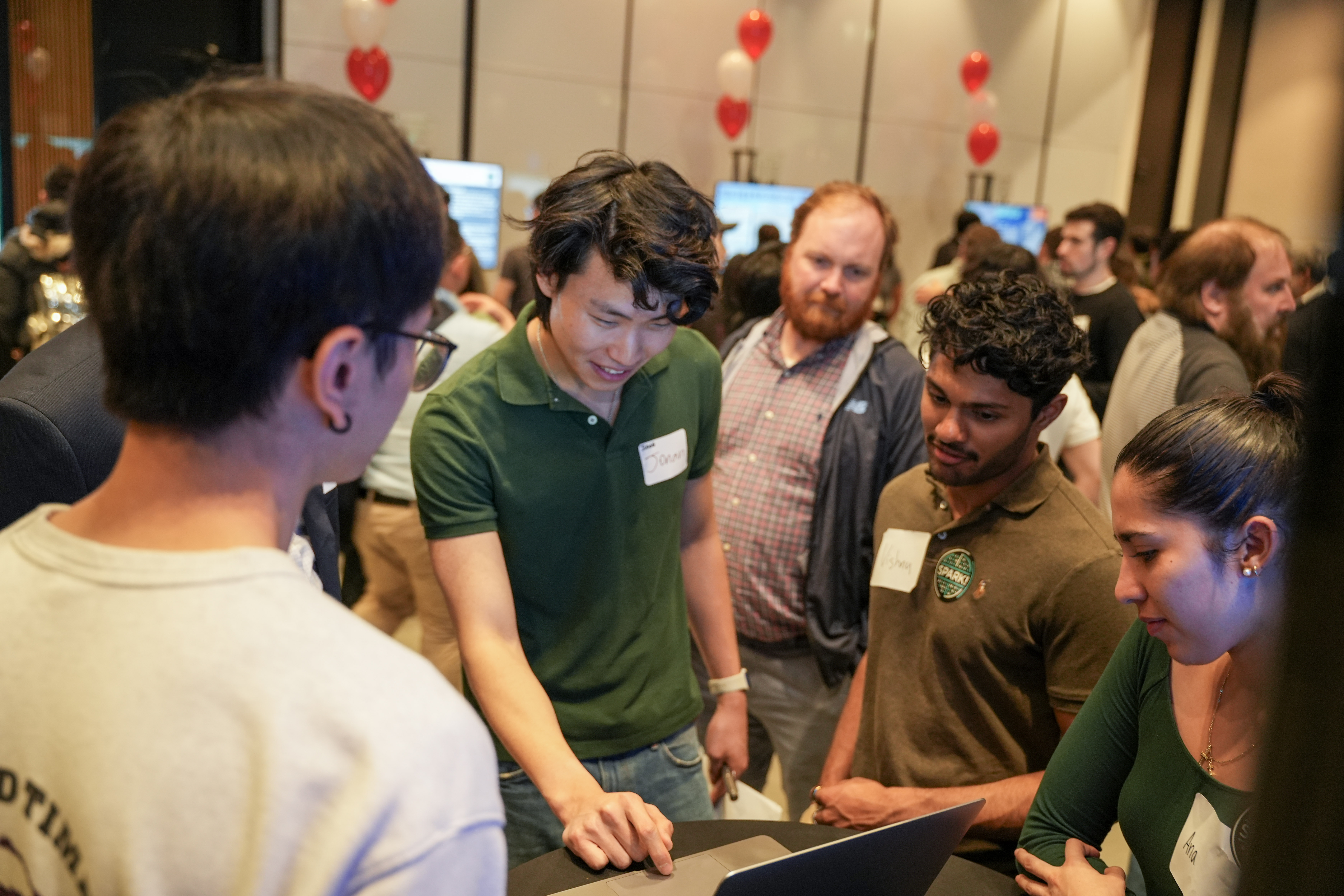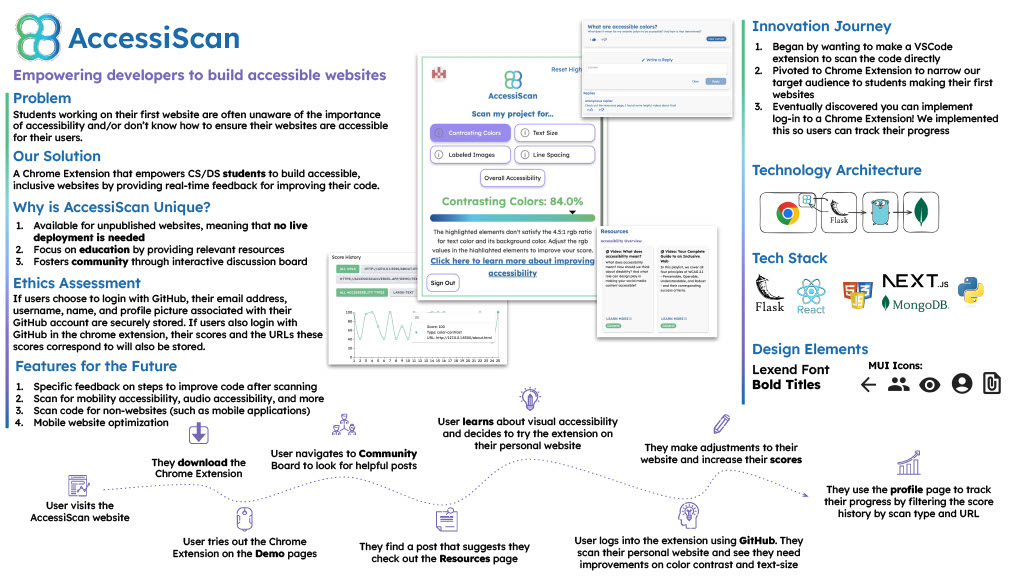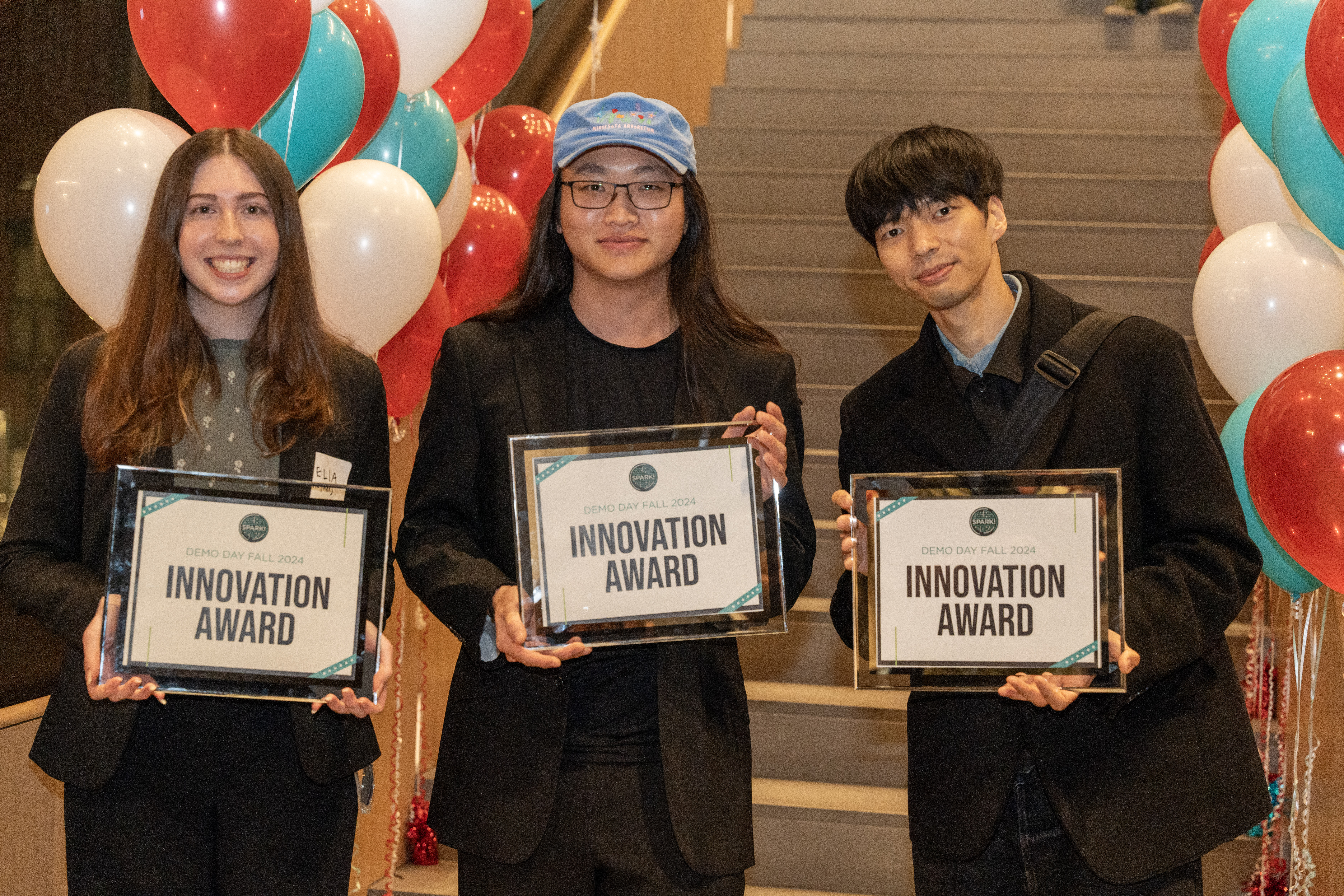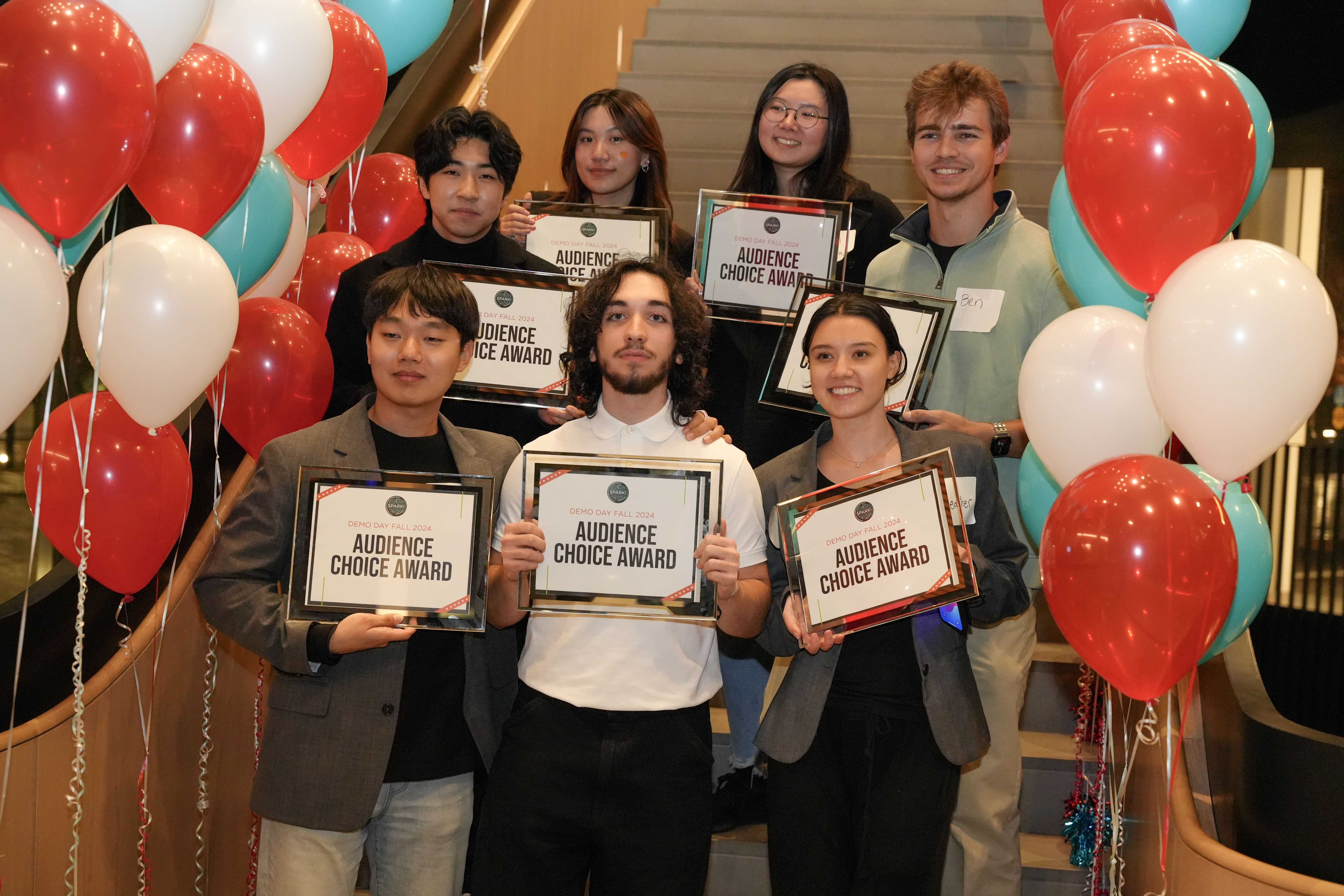Demo Day Fall 2024 Highlights Solutions in Accessibility, AI, Sustainability, and More

For Spark! students, the end of the semester doesn’t signal an end to their work. It is merely the beginning, as they demonstrated during Demo Day Fall 2024.
In bi-annual Spark! fashion, BU students, faculty, staff, and Spark! partners alike filled Floors 1 & 2 of the BU Center for Computing & Data Sciences this past Wednesday to celebrate the student innovators leading the charge on creating lasting change.
Demo Day was part of the Fall 2024 Experiential Learning Expo where students from the Faculty of Computing & Data Sciences, Cross-College Challenge, and the Learning Assistant Program, come together to inspire while presenting real-world solutions to problems that they’ve crafted over the course of the semester.
Learn just what makes Spark! students leaders in computing and data science by diving into each project below.
Winner’s Circle
These projects were selected by an esteemed panel of industry professionals and Demo Day’s audience.
AccessiScan — Judges’ Choice Award

AccessiScan is an innovative solution to the persistent challenges in web accessibility. By scanning websites directly from our Chrome extension, AccessiScan enables developers to proactively address accessibility during the design and development phase of their projects, even on local, unpublished websites. This unique approach offers developers early visibility into potential accessibility issues, such as contrasting colors, text size, line-spacing, and un-labeled images empowering them to create inclusive experiences from the start. Additionally, AccessiScan fosters a community of accessibility-focused creators through the community board. This space allows developers to share insights, discuss projects, and seek advice, creating a supportive environment that promotes accessible design practices. On our website, we have curated accessibility resources to offer in-depth explanations and recommendations. Together, AccessiScan’s tools and community provide a unique platform for educating, connecting, and empowering developers to make the web more accessible for all.
Team members: Amelia Liston (aliston@bu.edu), Hangi Ch (chgg2518@bu.edu), Ethan Key (ethankey@bu.edu), Jeffrey Ting (jting@bu.edu), Josephine Kim (josiek@bu.edu)
Links: GitHub |Product link | Poster | Presentation | Notion Scrum Page

Talentora — Audience Choice Award

Talentora is an HR tech platform which conducts 1000s of asynchronous conversational AI interviews and analyzes them using NLP and sentiment anaylsis. Allowing recruiters to interview, analysis, and screen 100x more candidates and get a better understanding of their fit before doing their own screening – allowing them to save time and hire better.
Team members:
Benjamin Gardiner (bengard@bu.edu), Vincent Li (vinli@bu.edu), Seungmin (Min) Cho (minjo@bu.edu), Ruby Chen (rc071404@bu.edu), Heather Davies (hd2535@bu.edu), Mehmet Battal (zbattal@bu.edu), Lucas Yoon (lyoon02@bu.edu)
Links: GitHub (Codebase) | GitHub (Analysis Bot) | Product link | Poster | Presentation | Notion Scrum Page

Innovation Program Project Gallery
Each project presented at Demo Day showcased exceptional creativity and ingenuity. We hope that all of these projects continue to flourish and reach the marketplace.
GreenView

GreenView is a pioneering platform that helps building managers and organizations visualize their environmental impact in real-time, driving actionable behavior change. Recognizing the need for more engaging environmental data reporting, GreenView turns complex sustainability data into dynamic, easy-to-understand visualizations. By integrating with existing building-level data tracking systems, GreenView captures real-time data on energy use, water consumption, waste generation, and other key indicators. GreenView goes beyond simply showing data; it encourages active participation in sustainability efforts. The platform includes interactive elements and tailored calls to action, prompting occupants to reduce their environmental footprint. Whether it’s lowering energy usage or improving recycling, GreenView’s visuals and insights help organizations meet their sustainability goals. By making environmental impact a shared responsibility, GreenView fosters a culture of sustainability within organizations. It’s more than just a reporting tool—it’s a catalyst for change, turning real-time data into real-world action, and helping buildings become greener and more efficient.
Team members:
Links: GitHub | Product link | Poster | Presentation | Notion Scrum Page
Jammini

Jammini is an online live English competition game that makes learning addictive for Korean students. Students can master difficult English exam concepts through competitive games with friends, improving their scores and growing alongside peers.
Team members:
Links: GitHub | Product link | Poster | Presentation | Notion Scrum Page
CodeHive

CodeHive is a startup born from a deep passion for CS and engineering, designed to address the challenges learners face in sharing their projects and receiving quality, real-time feedback. Unlike existing platforms like GitHub or Stack Overflow, CodeHive is dedicated to centralizing the growth and sharing experience for learners. To accomplish this, CodeHive enables users to seamlessly display their projects alongside their questions, giving other users the proper context to provide valuable feedback. Inspired by the personal experiences of its founders, most of whom study Computer Science, CodeHive targets individuals eager to enhance their skills in the coding world by providing them a platform to ask for advice on all things tech. CodeHive alleviates the pressures of being a newbie to CS, struggling to develop skills to land that big internship or first full-time role. We offer a space where learners can connect with like-minded peers who share their passion for technology, becoming an essential tool in the journey of every technologist.
Team members:
William (Will) De Rocco (wderocco@bu.edu), Matthew Hilliard (mch2003@bu.edu), Mensun Wang (mensun@bu.edu), Alexander (Alex) Miller (alexjmil@bu.edu), Aidan Clark (aidsc@bu.edu), Seo-Young (Emily) Yang (yang03@bu.edu)
Links: GitHub |Product link | Poster | Presentation | Notion Scrum Page
X-Lab and Practicum Presentations
MarketWatch – XC410 A1: Justice Media co-Lab – MarketWatch
Published on November 5th in MarketWatch: With Senate control at stake, these billionaires and groups have spent over $160 million on this one Montana race.
Social Justice App – DS488 / 688: UX Practicum
Working with Dr. Chad Starks, the goal of this project is to develop a tool that will allow Dr. Starks to engage with clients through a comprehensive course platform, streamlining his mission of empowering individuals and organizations to navigate complex social justice challenges. Additionally, this platform should act as a social justice-focused community hub, fostering equitable and inclusive spaces where users can voice their opinions, have important conversations, and facilitate their own journey of a more diverse, inclusive, and equitable organization or community.
BU Community Service Center – DS519: Software Engineering Practicum
The Boston University Community Service Center acts as the organizational body responsible for tracking students’ community service activities at Boston University. The BU CSC aims to streamline the volunteering process by connecting students with non-profits and volunteering opportunities, providing background checks and forms, as well as documenting students’ completed hours and reporting them to respective colleges. The CSC has been working with Spark! students to improve their online platform for student volunteers, BU CSC Admin, and 3rd-party organizations/non-profits.
Police Bias in Traffic Stops – DS539: Data Science Practicum
As a professor and long-time advocate for civil rights, Shira Diner is concerned about discriminatory trends in police traffic stops, and wants to understand whether police officers in MA are more likely to pull over a driver if they are Black or Hispanic. Our goal is to use existing metrics and newly obtained data to craft an algorithm to evaluate bias for individual police stop cases while identifying any trends that underscore a correlation between traffic stops and the race of the drivers who are being pulled over. This algorithm could assist public defenders utilizing Commonwealth V. Long by providing statistical evidence that an officer has discriminatory traffic stop behaviors.
NLG MA: Predictive Text – DS549: Machine Learning Practicum
National Lawyers Guild Massachusetts Chapter works to change the structure of our political and economic system. They seek to unite the legal community with organizers and activists in the service of the people, to the end that human rights shall be regarded as more sacred than property interests. The organization requests BPD complaint data from BPD Internal Investigations and receives complaint PDFs for each calendar year. They convert the PDFs to spreadsheet format and manually clean the data (takes 5 hours/file). Then, they manually read each complaint statement and tick the appropriate complaint category. They want to automate this and highlight systemic issues in the hearing process. This semester they also want to investigate deeper into whether the transcribed text/language indicates more extreme policing behavior, such as excessive force, racial bias, faking detail overtime, and more.
ConnectEd – DS594: Data Visualization
Connect Ed’s mission is to educate, encourage, and connect individuals, teams, organizations, and communities who want to play a productive role in their network. In 2022, Connect ED successfully made an effort to launch data collection from highschool students by using social system mapping to visualize this data for social analysis. This year Connect ED aims to collect and visualize data in the same way from both high school and middle school students. The goal is to collect a much better data set and higher degree of participation. The goal of this project is to identify relationships between student information (mental health, sports, clubs, connections, demographics, etc) and their sense of belonging in the school they attend in St. Helens as a mechanism for youth suicide prevention.
Sen. Markey: Grant Allocation (Team B) – DS701 (Gardos): Tools for Data Science
Each year, federal funding in the form of competitive discretionary grants is distributed to communities across Massachusetts for various projects and purposes. The goal of this project is to examine the equity of this allocation process on a local level, especially amongst BIPOC, low-income, and underserved communities. By creating a data analysis, repeatable process for metric reporting, an interactive site, and more, we hope to help Senator Markey’s office determine which parts of MA continue to be underserved in the allocation process.
BCH: Children’s Health Equity – DS701 (Ladenheim): Tools for Data Science- BCH: Children’s Health Equity
Team: Apoorva Gupta, Aashrey Jain, Hakob Janesian, Akshara Ramprasad
Boston Children’s Hospital (BCH) is a leading pediatric hospital focused on improving the health and well-being of children in Massachusetts. The hospital’s Office of Government Relations leads advocacy efforts at state, local, and federal levels, emphasizing social determinants of health and equity. The Hospital’s Office of Government Relations hypothesis is that the Commonwealth is underinvesting in public health approaches to supporting children’s health and well-being and children’s primary and preventative health care services relative to adult health. Students will analyze state government and health care spending (with a special focus on MassHealth / Medicaid) on children’s health, pediatric care, and well-being to identify underinvestment and gaps in spending on children and compare spending levels to national spending, similar states, or affluent countries.

Thank you to our Demo Day judges, instructors, mentors, and Spark! staff for making this event possible. The inspiration you’ve lit in these students is evident in their work.
—
Housed at Boston University’s Faculty of Computing & Data Sciences, BU Spark! is an incubator and experiential learning lab for computer science and engineering projects. Spark! provides the infrastructure to support student innovation projects and engagement in applied research or real-world technology projects, while fostering an inclusive, connected community around interdisciplinary computing and data science.